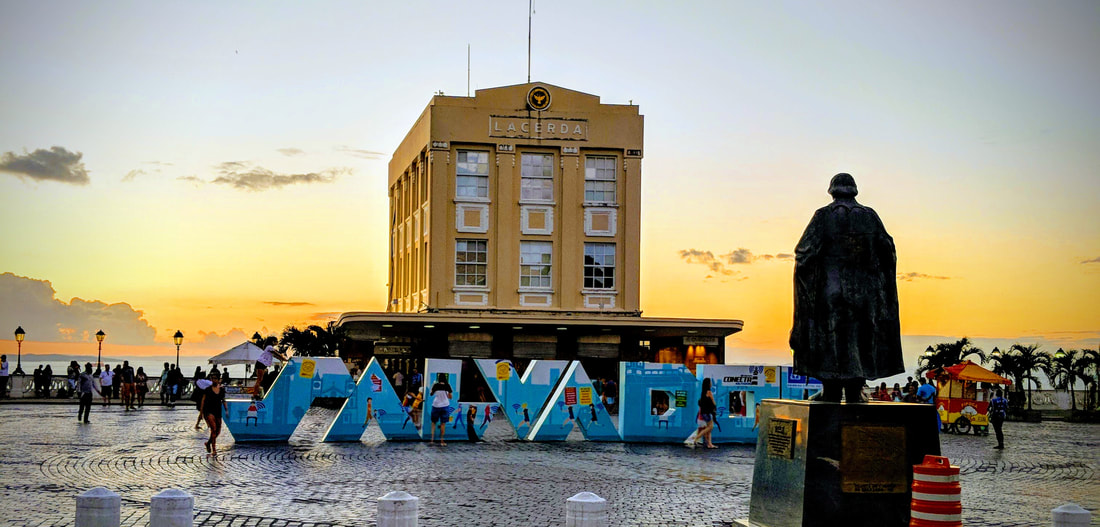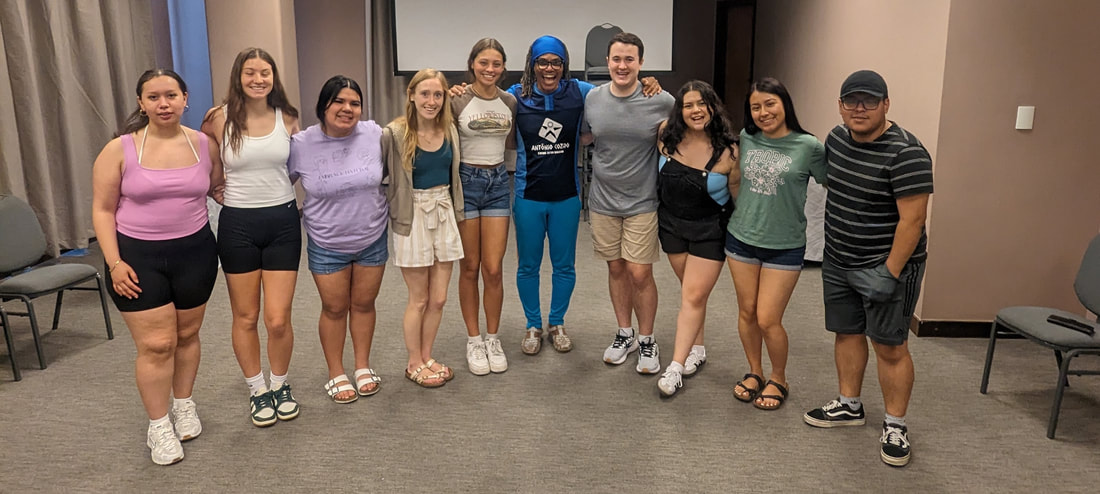|
By Alexa DeLeon Traveling from Chicago to Salvador, Bahia was an experience filled with exhaustion, but the journey has been significantly rewarding in such little time. Despite only being here for about four days, I’ve been amazed by how much I have enjoyed Salvador and, most importantly, how much I’ve learned about its rich culture. Adjusting to a new culture, especially with a language barrier, can be extremely challenging. However, the vibrant and fascinating aspects of Salvador’s culture have made it easy and enjoyable to want to learn more. Our first lecture focused on Candomblé and religion in Brazil, where Prof. Wyllis Santos explained how Candomblé, an Afro-Brazilian religion, significantly influences the cultural and spiritual lives of many Brazilians. My immediate reaction was to connect this to Crooked Plow. In class, we read Crooked Plow by Itamar Vieira Junior, which has become one of my favorite books. I found myself wanting to learn more and had many questions about the different spirits, the healers, and the community's trust in natural healing. I could not help noticing the correlation between the two, especially community, it is such an important part of the characters' lives in the book and in Candomblé. During the lecture, Prof. Wyllis Santos explained the spiritual, nature, and community-based connection that Candomblé followers emphasize. In Crooked Plow, the characters often turn to natural healing methods and spiritual practices to cope with their hardships, reflecting the Candomblé belief in the healing power of nature and the spiritual realm. Throughout the novel, the characters rely on traditional herbal remedies and the guidance of spirits. While Prof. Willy Santos explained the importance of nature and spirituality, he mentioned the significance of community help, specifically how pregnant women who produced milk helped others by breastfeeding their children if their milk dried up or for any reason, they were unable to breastfeed. This immediately reminded me of Crispiniana and Crispina. The story of Crispina breastfeeding Crispiniana’s child for two years is a significant example of communal support, especially among women. This mirrors the practices in Candomblé communities, where women play crucial roles. The act of breastfeeding another's child is a gesture of care and solidarity, highlighting the community's collective responsibility for everyone's well-being. During our first week we also had another lecture focused on the practice of Candomblé with Pai de Santo. He spoke a couple times about the importance of nature. I realized that the idea of the importance of nature became a common theme these past couple of days and has been stuck with me since. Nature plays a symbolic role in Candomblé, and I cannot help but wonder how different my ideas, beliefs, and mentality would be if nature and spirituality was deeply involved in my life. I was born into a catholic family, but we are not religious and practice only some catholic traditions. I do not necessarily agree with many teachings in the Catholic community, and having learned about spirituality and the importance of nature has motivated me to change the way I think and the way I want to live. During our time on campus, we delved into the rich traditions of Black music in Bahia, which initially left me unaware of the profound significance of movement and dance accompanying the music. Osmundo Pinho's book chapter, Race and Cultural Politics in Bahia, illuminated the importance of this movement, noting that “Black music in Bahia will be taken here as a social phenomenon, as an identity platform, and as an expressive discourse, central to the elaboration of forms of identity” (Pinho 2020, 3). In line with the themes of nature and spirituality, our workshop on Afro-Brazilian dance with Antonio Cozido was particularly inspiring. Antonio emphasized that our bodies are temples, and he linked dancing to the flow of energy within us. His explanation of how we control our bodies and manifest energy offered a new perspective on the connection between physical movement and spiritual expression. Black music and Afro-Brazilian dance are integral parts of the Afro-Brazilian culture, underscoring the idea that the body is sacred. Despite my dancing abilities not being present and my two left feet clearly shown, Antonio’s insights about the importance of dance and how it channels energy resonated deeply with me. This workshop connected seamlessly with the lectures we've had, highlighting the interconnectedness of nature, spirituality, and the human body. Experiencing the culture by learning and practicing the dance has deepened my appreciation for these values and inspired me to embrace this way of living. I cannot wait to spend another two weeks here; I am excited to learn more about the culture and hope to have a better understanding and a different mindset by the end of my time here. Sources: Pinho, Osmundo. “Race and Cultural Politics in Bahia.” In Oxford Research Encyclopedia of Latin American History, 2020. Vieira Junior, Itamar. Crooked Plow. Verso Books, 2019.  Alexa DeLeon is a sophomore at the College of Saint Benedict and Saint John's University, hoping tp purse a major in political science, with a concentration in pre-law. She is originally from Cicero, Illinois. Alexa enjoys learning about underrepresented communities in the realm of policy issues and likes to be an advocate for inclusion for marginalized communities. Something fun about Alexa is that she has seven dogs, 3 males and 4 females.
0 Comments
Leave a Reply. |
Archives
June 2024
Categories
All
|



 RSS Feed
RSS Feed
